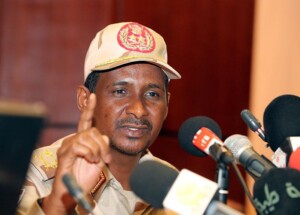North Darfur rebel movements told to remove their forces from towns
Governor of North Darfur Nimir Abdelrahman said that the third meeting of the High Council for Security Arrangements gave the leaders of the rebel movements that signed the Juba Peace Agreement seven days to move their forces from the towns to the ‘areas of support’, as stipulated in the Peace Juba Agreement.
 North Darfur Governor Nimir Abdelrahman (SUNA)
North Darfur Governor Nimir Abdelrahman (SUNA)
North Darfur Wali (Governor) Nimir Abdelrahman said that the third meeting of the High Council for Security Arrangements gave the leaders of the rebel movements that signed the Juba Peace Agreement seven days to move their forces from the towns to the ‘areas of support’, as stipulated in the Peace Juba Agreement.
The meeting was held in El Fasher in the presence of Chairman of the Sovereignty Council Lt Gen Abdelfattah El Burhan, Deputy Chairman Mohamed 'Hemeti' Dagalo, and the leaders of the rebel movements.
The governor said that the leaders of the movements were told to tightly control their members and return them to the military bases.
The rebel movements played an important role during the war in Darfur in the fight against dictator Omar Al Bashir, who has been accused of facilitating war crimes and genocide in the region.
Protests
North Darfuris expressed their discontent with El Burhan and Hemeti recently as the coup-leaders paid a visit to the state earlier this month.
El Burhan and Hemeti and a number rebel leaders participated in a periodic meeting of the joint Supreme Council for security arrangements during that visit. The delegation engaged in lengthy closed-door meetings to discuss the security arrangements clause for the Darfur track in accordance with the Juba Peace Agreement, and the formation of the Joint Forces.
At the time, the visit sparked protests organised by resistance committees who refused to acknowledge the visiting coup leaders and the Supreme Council delegation as legitimate authotiries. Military forces fired tear gas on the peaceful demonstrators and launched a campaign of mass arrests of politicians and activists in the resistance committees.
The large military presence was also met by local branches of the Sudanese Professional Association and the Coordination of Displaced Persons and Refugees, who all issued separate statements boycotting the arrival of the coup leaders in El Fasher.
The Central Committee of Doctors explained in their field report that in addition to the use of tear gas, sticks, batons, and metal chains were also used to disperse the demonstrations, causing severe injuries.











 and then
and then